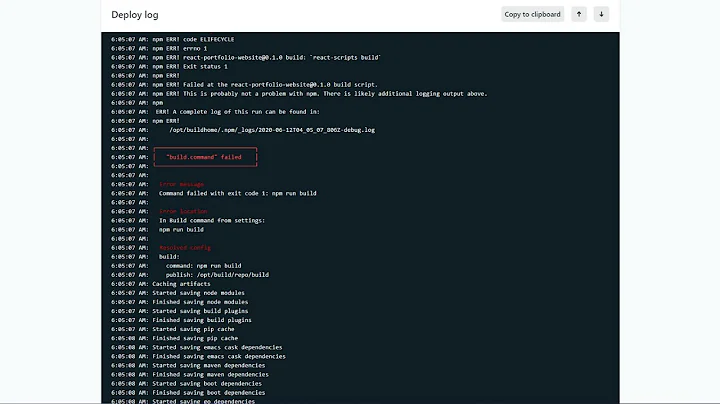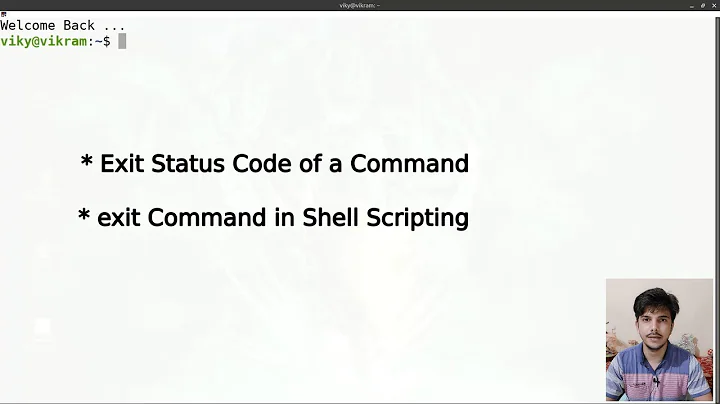How to get the exit code of commands started by find?
Solution 1
Using Stephen Kitt's suggestion in comments:
find . -type f -iname "*.sh" -exec sh -c 'for n; do ./testScripts.sh "$n" || exit 1; done' sh {} +
This will cause the sh -c script to exit with a non-zero exit status as soon as testScript.sh does. This means that find will also exit with a non-zero exit status:
If terminated by a plus sign, the pathnames for which the primary is evaluated are aggregated into sets, and utility will be invoked once per set, similar to
xargs(1). If any invocation exits with a non-zero exit status, thenfindwill eventually do so as well, but this does not causefindto exit early.
Regarding the questions in comment:
for n; do ... ; donelooks weird but makes sense when you realize that without anything to iterate over, theforloop will iterate over"$@"implicitly.The trailing
shat the end will be placed in$0of thesh -cshell. The{}will be substituted by a number of pathnames. Withoutshthere, the first pathname would end up in$0and would not be picked up by the loop, since it's not in$@.$0usually contains the name of the current interpreter (it will be used in error message produced by thesh -cshell).
Solution 2
xargs will exit with an exit status between 1 and 125 (123 with GNU xargs), if any of the command fails, and will abort if any fails with a 255 status.
To use xargs reliably on the output of find (with -print0) and preserve the command's stdin, you'd need GNU xargs though. So, with GNU xargs and a shell with support for process substitution like ksh, zsh or bash:
xargs -n1 -r0a <(find . -type f -iname '*.sh' -print0) sh ./testScripts.sh
Or to abort at the first failing one:
xargs -r0a <(find . -type f -iname '*.sh' -print0) sh -c '
for file do
sh ./testScripts.sh "$file" || exit 255
done' sh
You can also abort find upon the first error with (POSIX code):
find . -type f -name '*.[sS][hH]' -exec sh -c '
for file do
if ! sh ./testScripts.sh "$file"; then
kill -s PIPE "$PPID"
exit 1
fi
done' sh {} +
(using SIGPIPE as a less noisy signal with some shells like bash). That will cause find to be killed and so return with a non-zero exit status.
To get the exact value of the exit status of the (here last) failing commmand, with zsh or bash, you can also do:
ret=0
while IFS= read -rd '' -u3 file; do
sh ./testScripts.sh "$file" 3<&- || ret=$?
done 3< <(find . -type f -iname '*.sh' -print0)
Though with zsh, you don't even need find for that:
set -o extendedglob
ret=0
for file (./**/*(#i).sh(D.)) {
./testScripts.sh $file || ret=$?
}
Related videos on Youtube
rugk
Apparently, this user prefers to keep an air of mystery about them. … I mean, yes I do. There is also not a lot to tell… You can follow me on Mastodon or check out my GitHub or GitLab profile.
Updated on September 18, 2022Comments
-
 rugk over 1 year
rugk over 1 yearI am using "find" in a Travis-CI to check a particular file type with a program. (To be exact, it is a shellcheck check.)
However, when using
findthe exit codes of the command(s)/subshells executed by it are naturally discarded, as they are not passed to the "main script".As an example this is a find command:
find . -type f -iname "*.sh" -exec sh ./testScripts.sh "{}" \;./testScripts.shmay exit with 0 or >= 1, depending on the test result.The
testScripts.shexits properly with the correct exit code, but due tofindthe exit code of the command is always "0". All I want is, that if one file/execution errors, this error is "propagated" up to Travis-CI.How can I accomplish this?
-
Stephen Kitt over 6 yearsCan you change
testScripts.shso it accepts multiple scripts to run? That way you could use the-exec {} +variant, which exits with status != 0 if the command fails. -
 rugk over 6 yearsYes, that is possible. Would need another loop in the
rugk over 6 yearsYes, that is possible. Would need another loop in thetestScripts.sh, but that is acceptable.
-
-
 rugk over 6 yearsNote the "this does not cause find to exit early.". This is important to know. Not that it matters in my case (it may actually be a good thing), but just FYI.
rugk over 6 yearsNote the "this does not cause find to exit early.". This is important to know. Not that it matters in my case (it may actually be a good thing), but just FYI. -
 Kusalananda over 6 years@rugk Sorry, there was a
Kusalananda over 6 years@rugk Sorry, there was adomissing. Fixed now. -
 Kusalananda over 6 years@rugk
Kusalananda over 6 years@rugkfor n; do ...; donewill iterate over the positional parameters. These are given by{}on the command line after that lastsh. The trailingshwill be placed in$0, which is not a positional parameter (in the same sense as$1etc. are). -
 Kusalananda over 6 years@rugk See also update.
Kusalananda over 6 years@rugk See also update. -
 rugk over 6 yearsThanks for the update. It works. One thing I noticed: In this way, it actually does exit early when an exit code is returned in any of the
rugk over 6 yearsThanks for the update. It works. One thing I noticed: In this way, it actually does exit early when an exit code is returned in any of the./testScripts.shexecutions. Also I like the_way more, thanks for the explanation though… Some final questions though: 1. As having everything in one line may not be nice, is it be possible to move the "for" loop into the./testScripts.shfile? 2. When./testScripts.shreturns an error code > 1, thefindoutput is always "1". Even if I change the line to "exit $?" – it does not work. Can I keep the "correct" exit code, somehow? -
 Stéphane Chazelas over 6 yearsNote that the
Stéphane Chazelas over 6 yearsNote that the|| exit 1exits thatshinvocation but does not prevent moreshinvocations from being started. Withxargs, you can use the 255 exit status to causexargsto abort. See also the-quitpredicate of GNUfindor-exitpredicate (which can take an exit code as argument) of netbsd. -
 rugk over 6 yearsThanks for your answer. Basically it seems to use the same concept as @Kusalananda's answer, but this here looks a bit more complicated. Anyway, good to have alternatives.
rugk over 6 yearsThanks for your answer. Basically it seems to use the same concept as @Kusalananda's answer, but this here looks a bit more complicated. Anyway, good to have alternatives. -
 Stéphane Chazelas over 6 years@rugk, see my comment though on @Kusalananda's answer,
Stéphane Chazelas over 6 years@rugk, see my comment though on @Kusalananda's answer,findmay run more than oneshinstance depending on how many files there are, the size of the environment, and the current limit on that stacksize (if on Linux)




